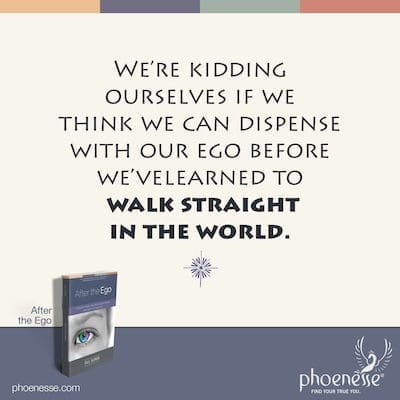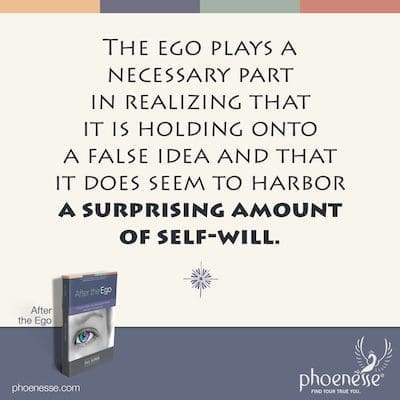Каков финал человеческого бытия? Куда мы все катимся? В чем смысл жизни? Наша цель всегда одна: стать нашим Настоящим Я. Все многочисленные учения Путеводителя подходят к одной и той же задаче, подходя к ней с разных сторон. Работая в этом направлении, нам будет полезно понять, чем наше внутреннее «я», или Настоящее «Я», отличается от нашего внешнего «я», или эго. Какова связь между этими двумя? Многие из нас, услышав различные противоречивые теории, не понимают функции эго.
Некоторые постулируют, что эго по своей сути негативно и поэтому нежелательно. Итак, цель духовности - избавиться от нее, верно? Другие теории - особенно с психологической точки зрения - говорят, что наше эго важно, поскольку мы не можем быть психически здоровыми без эго.
Какая из этих точек зрения верна? Давайте узнаем. Ведь если наше видение этого неясно, будет трудно достичь нашей важнейшей цели самореализации.

Мы обманываем себя, если думаем, что можем обойтись без своего эго до того, как научимся ходить по миру прямо.
First, let’s clarify the Real Self and its essence. This is our inner self and it is an integral aspect of nature. As such, we are bound to the laws of nature. And nature is something we can trust. It’s not reasonable then, to not trust ourselves—to not trust our сокровенное selves. If it seems to us that nature is our enemy, this is only because we don’t understand the natural laws that nature is following.
So our inner self is nature. Our Real Self is life. We are creation. This is a better way to say it than to say we are “a part” of nature, or part of creation. Our Real Self and nature are one and the same thing.
Всякий раз, когда мы действуем исходя из нашего Истинного Я, мы на самом деле пребываем в радости. Наш самый конструктивный и творческий вклад в жизнь исходит из нашего внутреннего «я». Итак, все, что расширяет жизнь - все мудрое, красивое и щедрое - исходит отсюда. Об этом стоит подумать, так как на этом нельзя слишком много подчеркивать. Важно, чтобы мы понимали эту истину не только своим умом - нам нужно это чувствовать.
Если это так, то какова функция нашей внешней личности - нашего эго? Это та часть нас, которая действует на уровне, к которому мы имеем прямой доступ. Поскольку мы непосредственно или сознательно осознаем свое эго, это наше сознательное понимание. Это та часть нас, которая думает, действует, сортирует и принимает решения.
Если у нас слабое эго, нам будет трудно справляться с жизнью. Если у нас будет разросшееся эго, мы потеряем свое Настоящее Я. Другими словами, обе крайности — слабость эго и раздувание эго — приведут к отделению от нашей внутренней сущности. И это, по сути, наша проблема. Все наши жизненные конфликты происходят из-за того, что у нас слишком большое или слишком маленькое эго.
Чаще всего дело не в том, что у одного человека большое эго, а у другого слишком маленькое. Скорее, оба имеют дисбаланс внутри себя. Мы недоразвиты в одной области нашей личности и чрезмерно развиты в другой. Так что природа пойдет своим чередом и попытается восстановить баланс. Таким образом, чрезмерное развитие нашего эго может быть естественным способом устранить беспокойство, вызванное слабым эго в другой сфере нашей жизни.
It’s only after we’ve sufficiently developed our ego that we can be done with them. Maybe this sounds like a contradiction, but it’s not. Because if our ego is not well-developed, all our efforts to compensate for this will wind up leading to more weakness. So we’re kidding ourselves if we think we can dispense with our ego before we’ve learned to walk straight in the world. For as long as we lack a strong enough ego, we lack the ability to think, sort, decide and act appropriately in any situation that comes up.
If we hope to reach the holy grail of our Real Self by rejecting the effort needed to develop a healthy ego, we’re coming at things from a place of poverty. The correct way forward is to fully own and operate our outer selves first. If we hope to skip the creation of a healthy ego—perhaps because we’re too lazy—we’re in error. And this is going to cost us, as all errors do. Make no mistake, developing a healthy ego is no easy thing. But we simply can’t avoid this work. Doing so only delays reaching our goal.
To restate the situation: Only when we are in full possession of our outer ego-self can we let go of it and reach our inner self. This is not a theory; this is a spiritual law. And it’s actually a logical law that pushes us to act from a place of strength and abundance, rather than from a place of neediness and poverty. Then, once we reach this mini-mountaintop—when we are in full possession of our outer ego—we’ll have the much-needed perspective that, hey, this is not the final answer. This is not the end-all and be-all of who we are. Now, with the use of an ego that’s neither underdeveloped nor overemphasized, we can start to transcend ourselves and reach a higher state of consciousness. But not before then.
So as we make our way along our spiritual path, we’ll begin—perhaps through meditating—by applying the faculties of our ego. In practical terms, we’ll use our ego mind to absorb what’s going on in our life and sort out the truth of the situation. Only later will we be able to grasp things on a deeper level of our being, in our greater consciousness.
Many people don’t even realize there is anything beyond their ego. They think the goal of life is to cultivate a strong ego—although they may not think about things in these terms. And that’s how an overdeveloped ego comes into play. But this is a dead-end street. It misses the whole point. Instead of reaching the stage of having a powerful ego that can be transcended, the person further aggrandizes it. But the scope of the ego is so limited and the possibilities so puny, there’s nothing great happening here at all.
It’s super important to understand the spiritual law at work here. It’s the law stating we must fully reach a certain state of being before we can abandon it for something better. Too often, we totally ignore this law. Our Real Self knows that the universe is unlimited, and that absolute perfection exists. In our Real Self, we know that we can ultimately expand and reach the sky. And when we get there—when we’re fully living from our real inner selves—we will become the master of all natural laws.
We all deeply yearn to live in this final reality, and to reach our full potential. But if we hear the call of this message from our deepest inner selves without the benefit of a healthy ego, we may distort the meaning. Then we will childishly strive for perfection.
Think of a baby at birth who has no ego. It only wants one thing: total pleasure. Babies seek omnipotence, without frustration or lack of fulfillment. To go on with such strivings though, without the development of an ego, is to be unrealistic and even destructive. And so it is that on a spiritual path, we learn that we must let go of our forceful demands before we can come to our desires, fresh and new, and actually realize them.
The long and short of it is this. We must accept our limitations as human beings before we can tap into the unlimited fount of power sitting in our core, waiting for us to find it. We must accept our imperfections, as well as the imperfections of life on Earth, before we can reach our destiny, which is to live with absolute perfection.
And the thing stopping most of us from getting there is this: We must shed the childish notion that we can have all this and not work for it—that we can get there without the aid of a well-developed ego. We have to let go of our outdated desire for pleasure supreme and figure out how to make do with limited pleasure, before we can discover all that can be ours. To accept less is to accept life as it is right now, in this earthly reality. And to do this, we’re going to need to have an ego.
Once our ego is well-equipped for dealing adequately with what this earthly realm offers—which is where our body and soul now lives—then we can deeply comprehend our greater faculties. But we must walk before we can run. So yes, our ultimate goal is perfection, unlimited power and full pleasure. And these aren’t things to only hope for in a faraway future, after we’ve left our body. The measure is not time, but quality. And these qualities can exist at any time. In particular, they will exist the moment we awaken to truth—the moment we wake up. Yet we can awaken to truth only when we’ve found and let go of our childish demands for utter perfection, utter power and utter pleasure.
When we still have a weak ego, these are selfish desires that are also destructive. So our work—if we want to attain our desires—must be to abandon them. This is the same basic spiritual law that says: If we work from abundance, we’ll create more abundance; if we work from poverty and need, we’ll create more poverty and need.
When we have a strong, healthy ego, we can relax into our current reality without being upset that we may not get to experience fulfillment right now. We realize that there must be obstructions within ourselves that must give way before bounty can come. But when we have a weak ego, we can’t wait. We think we’ll just die if our wish to rule the world doesn’t happen. Our wish, then, is a negative one. We’ll cling to the limited laws and conditions of the little ego, and doing so will distort the greater laws.
From our weakness and our neediness, our undeveloped ego will avoid the work necessary to create strength and fullness. Instead of adequately dealing with what’s in front of us, we’ll try to bypass it. But once we get a taste of our Real Self, we’ll no longer fear it. Then we’ll stop over-emphasizing our ego. We will no longer neglect the important work of developing our ego faculties, which too often are slumbering, left untended.
Best of all, we’ll trust life, because we’ll begin to trust ourselves. Trust, after all, is an essential key for living a good life.

Эго играет необходимую роль в осознании того, что оно держится за ложную идею и что оно действительно таит в себе удивительное количество своеволия.
The ego’s job description
False ideas and ego-directed self-will are a natural part of the ego world. They are not, however, natural aspects of our Real Self. Fortunately, all egos come equipped with the innate ability to give up both false ideas and self-will. In fact, только the ego has the power to do so. The ego is also given the important task of changing its own mind and its intention.
It plays a necessary part in realizing that it is holding onto a false idea and that it does seem to harbor a surprising amount of self-will. Then it’s up to the ego to decide whether to continue down the road it’s on, or try a new path and abandon these two burdens.
The ego alone enjoys the job of exchanging a false idea for a truthful one. Doing so typically involves letting go of tense, anxious self-will and swapping it out for a flexible, free-flowing will that is relaxed. This critical work will, of course, require the use of the ego’s well-developed reasoning powers, along with a willingness to call upon the intuitive levels of the self for higher inner guidance.
“All the blessings are extended to every one of you. These blessings are a reality that transcend and envelop you. They are the universal love, responding to your valiant efforts of self-expansion. Be in peace, be in God!”
–Руководство по Pathwork

Следующая глава
Вернуться После эго Содержание:
Read Original Pathwork Lecture #132: The Function of the Ego in Relationship to the Real Self

